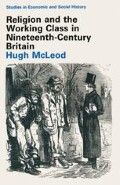Abstract
In eighteenth-century Britain, the Established Churches may have been declining, but they still had a pervasive influence on everyday life. The parish clergy enjoyed considerable prestige, especially in Scotland. Control over parish education, over many parish charities in England, and over the general system of poor relief in Scotland (until 1845) also gave them widespread influence upon the secular affairs of their parishes. The parish church, as the place where the overwhelming majority of the population was baptised, married and buried, was the main symbol of community, even for those who seldom went to church at other times. Indeed, the bitter disputes over patronage (the right to choose the minister) in eighteenth- and nineteenth-century Scotland, and over ritual in nineteenth-century England, reflected the widespread feeling that the parish church belonged to the people, and that it was everyone’s concern what went on there [Brown, 1981, I, 39, 46–8, 57; McLeod 1974, 187–8], In this situation, those who deliberately cut themselves off from the parish church formed a highly visible group, limited to the status of second-class citizens, and regarded with suspicion by their more orthodox neighbours. The Statistical Account of Scotland in the 1790s showed that many parish ministers knew the religious affiliation of every family in their parish, and the same was true of many Anglican rural and small town incumbents, who provided their bishops with precise breakdowns of the religious composition of their parishioners.
Preview
Unable to display preview. Download preview PDF.
Author information
Authors and Affiliations
Copyright information
© 1984 The Economic History Society
About this chapter
Cite this chapter
McLeod, H. (1984). Identity. In: Religion and the Working Class in Nineteenth-Century Britain. Studies in Economic and Social History. Palgrave, London. https://doi.org/10.1007/978-1-349-05213-4_4
Download citation
DOI: https://doi.org/10.1007/978-1-349-05213-4_4
Publisher Name: Palgrave, London
Print ISBN: 978-0-333-28115-4
Online ISBN: 978-1-349-05213-4
eBook Packages: Palgrave Social & Cultural Studies CollectionSocial Sciences (R0)

